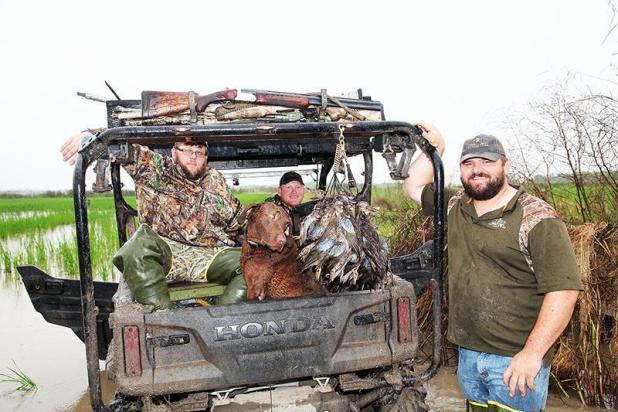
Hunting helps farmers recoup and defray costs of during the year. From left are Chad Welch, Thomas Landers and Charles Schultz following a September teal hunt. (Submitted Photo/Courtesy of John K. Flores)
Faith, hunting big part of 5th generation farmer's business
Charles Schultz stands about 6 feet tall or so and is a burly guy. Not in the way of overweight or out of shape, mind you. In college at Northeast Texas Community College and later McNeese State University, where he earned his degree in Agriculture Business, he participated in team roping and steer wrestling rodeo competitions.
He’s also a fifth generation farmer. His great-great grandfather and grandmother left Germany during World War I to settle among family members in the Robert’s Cove community northeast of Crowley. In fact, the 33-year-old Schultz says his great grandfather was born on the boat on the way to America.
His life and family’s history represent the fabric our nation was built on. But, it hasn’t come without challenges.
Following a recent teal hunt, Schultz and I drove past 200 acres of soy beans damaged from too much rain.
Soy beans require well-aerated soils. While looking over his crop, Schultz was quiet. The limp greenish, yellow-colored leaves of the plants were indicative of plants with root rot disease and in all likelihood past saving.
Before Schultz and his wife Samantha were married, he tells the story how his then-girlfriend had doubts about such struggles.
“We’d been dating a while, and as a farmer, you go through your struggles financially here and there,” Schultz said. “She told me, ‘Charles, I don’t know if I can do this.’ So, I said, ‘Well, baby, if you don’t want to deal with this, we’re not married, but once we’re married you’re stuck with me.’”
Schultz happily says his spouse obviously decided to stay, and after about a year of ups and downs and the ins and outs of farming, she told him, “Charles, never have I prayed so much!”
In short, no matter how broad your shoulders are or how strong you might be, a farmer’s life is tough one, where the Hebrew’s verse, “Faith is the substance of things hoped for and the evidence of things not seen,” is true daily.
One of the ways southwest Louisiana farmers offset some of the farming costs is leasing land or blinds to waterfowl hunters during the fall and winter months. Others, like Schultz, do some of their own guiding.
Schultz says he started hunting when he was 13 years old. His grandfather gave him and his cousin, who was 11 at the time, two blinds to themselves.
Schultz, who is owner/operator of Live Oak Outfitters, said, “He taught us not to shoot them out, telling us you have to rotate blinds even though one is hot right now, where you still have to give it a break. We learned some big lessons early on about conservation and how to control pressure on the birds.”
Schultz, of late, says he has slowed down his guide service a bit to concentrate his efforts towards conservation and making hunts better for his clientele.
Schultz, who points out that he is a farmer first and waterfowl hunter second, said, “The reasons I made the decision to go to a commercial operation and not lease blinds, running it myself, is I can control my own destiny. If I need a field dry for next spring, I can keep it dry, where if I had leased a blind and they wanted water on it, I’d have to leave it flooded.”
Schultz says though he doesn’t personally own property, his family does own some farm land. But, all total, they farm 1,200 acres, much of which is planted with rice. As such, relationships with landowners, be they absentee or present, must be maintained.
“Landowners have to have a lot of trust and confidence in us that we’re going to take care of their land and not tear it up,” Schultz said. “These landowners spend 1,000s and 1,000s of dollars improving their farms. So, as a hunter, I’ve got to really take care of their land. On the other side of the coin, I’ve also got to make my living on it in the spring.”
In talking with rice farmers, some point out the price of a hundred-weight of rice hasn’t changed much over the recent past, but fuel, equipment and operational costs have.
The guide services farmers and landowners offer provide hunters with opportunities and access to “notably” better than average hunting – particularly where waterfowl hunting is concerned. Moreover, many are reasonable priced and affordable.
Hurricane Harvey took its toll on Schultz’s operations a year ago, and the previous year, he suffered through a low-pressure system. As a result, he says he lost 60 percent of his crop the past two years.
Schultz mentioned after a long day in the field, where a meal is brought to him at the rice-dryers or on a combine by his wife, he wonders sometimes why he farms with such struggles. But, when he gets home at 1 a.m. during harvest and peeks into his 2-year-old son Cade’s room, he says that’s when it becomes a reality and why he is farming. But, another reason, the farmer says, is “I’m a fifth-generation farmer here in the United States and proud of it.”
If you wish to make a comment or have an anecdote, recipe or story you wish to share, you can call Flores at 985-395-5586 or email him at gowiththeflo@cox.net.
